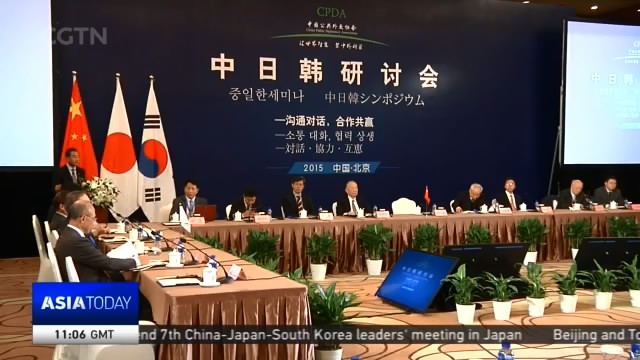
20:08, 08-May-2018
Premier Li's Visit to Japan: Chinese premier to meet PM Abe and South Korean president
02:21

During his visit, Premier Li will be joined in a trilateral meeting by Japanese Prime Minister Shinzo Abe and South Korean President Moon Jae-in. It's hoped the meeting -- the seventh of its kind -- can open up new prospects for cooperation, and contribute to regional peace, stability and prosperity. Zheng Yibing has more.
The trilateral leaders' meeting will resume after two and a half years.
It shows a shared interest.
KONG XUANYOU CHINESE VICE FOREIGN MINISTER "It will deepen cooperation among China, Japan and South Korea."
Topping the leaders' agenda, are their common concerns.
PROFESSOR GAO HONG CHINESE ACADEMY OF SOCIAL SCIENCES "The three nations are facing a changing global pattern. Their economic integration in the region was not pushed forward timely. What's more important, is they need to have mutual political trust."
Free Trade Agreement negotiations among the three lacked substantive progress, after a trilateral Investment Agreement was signed in 2012.
And what remains as a concern for China and South Korea is Japan's stance on historical and territorial issues. But coming together again is a good start.
RONG YING VICE PRESIDENT, CHINA INSTITUTE OF INT'L STUDIES "The resumption of the stalled China-Japan-South Korea high-level talks would be very important for their ties, for the regional peace and development, and for a more open world economy, and we have high expectations."
The trilateral mechanism was initiated in 1999, with annual leaders' meeting launched in 2008. Despite suspensions in 2012 and 2015 due to policy disagreements, the countries are intertwined with each other.
The total trade among the three countries registered around $670 billion in 2017, and over 28 million people traveled in between the three countries. The main task for their leaders now is to seek more common ground during this meeting.
ZHENG YIBING BEIJING "Many hope the long-expected meeting points in the direction of future cooperation, push forward the negotiations on the trilateral Free Trade Agreement, oppose trade protectionism and promote regional economic integration. Zheng Yibing, CGTN, Beijing."

SITEMAP
Copyright © 2018 CGTN. Beijing ICP prepared NO.16065310-3
Copyright © 2018 CGTN. Beijing ICP prepared NO.16065310-3